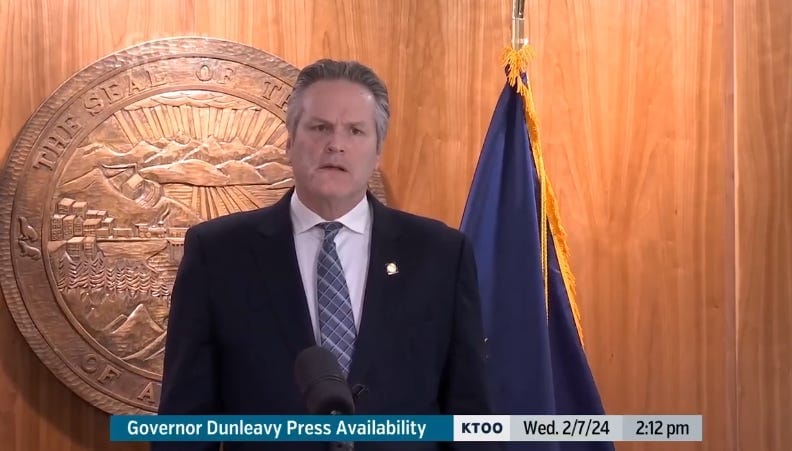AKLEG Day 92: 'Direct benefit'
Republicans have bristled at attempts to increase oversight on public home school allotment spending. Now we know why.

Good morning, Alaska.
In this edition: The last week has felt like drinking from a fire hose between the House’s operating budget marathon, a long overdue fight on a PFD measure and, of course, the titanic fallout of a court ruling that invalidated a scheme to use public home school money to subsidize tuition at private and religious schools. In today’s edition, let’s unpack the decision, how we got here, what it says about the Dunleavy administration’s priorities on public education and the potential paths ahead.
Current mood: 😵💫
‘Direct benefit’

There’s long been debate (and lawsuits) about precisely what the Alaska Constitution’s clause requiring the Legislature to “establish and maintain a system of public schools” means when it comes to school funding and education policy. Many argue it means the state has to be doing more than it’s doing now, some brush it off and a few suggest that it’s grounds for a radical upheaval of schools that would put the entirety of the financial burden on the state. For all that ambiguity, the Alaska Constitution’s education clause is crystal clear about one thing: “No money shall be paid from public funds for the direct benefit of any religious or other private educational institution.”
Yet, under a provision that Sen. Mike Dunleavy snuck into state law back in 2014 and quiet policy changes by the Gov. Mike Dunleavy administration in recent years, that very thing has been happening. Public home school programs, private and religious schools, and even the wife of Attorney General Treg Taylor have written at length about how to take advantage of the public dollars to subsidize private school tuition.
They had found one weird trick to ignore the Alaska Constitution, or they thought so.
Last week, Anchorage Superior Court Judge Adolf Zeman ruled that the practice was not only unconstitutional but so flawed that the entire cash payment system must be struck down along with other elements of the laws governing the state’s public home school system. The ruling leaves the state’s more than 24,000 home school students facing uncertainty and legislators scrambling for a potential fix, but it also illustrates just how audacious some are when it comes to taking advantage of the system.
The goods: Judge Zeman’s ruling striking down home school allotments
For a long time, Alaska’s public home school system has allowed local school districts to grant families a portion of the base student allocation to help cover some of the education costs. Until the 2014 change, there was oversight and guardrails on how that money could be spent with districts putting together vendor lists. After the change, the doors were thrown wide open in the name of parent choice.
The law simply says families can use the allotments, which can be up to $4,500 per school year, to purchase “nonsectarian services and materials from a public, private or religious organization.”
One family intervened in the lawsuit to argue that they’d be in tough financial straits if they couldn’t subsidize their kids’ private education with public funds. Judge Zeman’s order notes that the family would have spent more than $350,000 in public education dollars on private and religious materials if they had maximally used the allotments during the course of the schooling of their six children.
“This is by no means a ‘trivial’ amount of money,” Judge Zeman wrote, adding that the Alaska Constitution does not condone the family’s behavior.
“They note that without the allotment money, they could not send their children to private school or that doing so would create a significant financial burden,” Judge Zeman continued. “Parents have the right to determine how their children are educated. However, the framers of our constitution and the subsequent case law clearly indicate that public funds are not to be spent on private education.”
And it’s not just a case of a family here or there getting creative with the rules. Anchorage’s biggest K-12 private school, Mountain City Christian Academy (run by what was formerly the Anchorage Baptist Temple), automatically enrolls students in the home-school program run by the Denali Borough to receive $3,000 subsidies through the allotment program.
While there are a lot of questions about how Sen. Dunleavy was able to sneak the measure past the known constitutional defects, it’s not clear just how long it took for people to start using the allotments as private religious school vouchers. The practice began to make headlines in 2022 when the Alaska Beacon reported that several state-licensed home-school programs were explicitly allowing families to use the allocations for private school tuition, with several even writing advice on how to do it. That included writings by Jodi Tayor, the spouse of Attorney General Treg Tayor, on how to take advantage of the program. Two months after that, Deputy Attorney General Cori Mills published a ludicrous legal opinion that the program favored by the Taylors didn’t violate the Alaska constitution as long as it didn’t pay for most of the private school tuition.
In this trial, both the state and the intervening families argued that the practice didn’t violate the Alaska Constitution because the families ultimately decided to spend the money on the direct benefit of private and religious schools, not the state. They argue that families receive direct benefits, not private religious schools. It’s a particularly odd argument given Mills’ legal opinion that concedes there’s some level of spending by families that would cross the threshold. Judge Zeman disagreed with the groups’ claim, pointing to the $350,000 in tuition that private religious schools could receive from just the intervening family.
What’s next isn’t entirely clear, but Judge Zeman said it’s not for the court to fix.
“If the legislature believes these expenditures are necessary — then it is up to them to craft constitutional legislation to serve that purpose — that is not the court’s role,” he said.
While there’s been a lot of talk about the need to resurrect the program with constitutional guardrails, the scope and depth of the scheme are likely to give some legislators pause and encourage others who have long been quietly skeptical of the program. It’s particularly interesting timing given the House Education Committee has already advanced the House Republicans’ make-up education bill last week, rejecting several amendments that would have called for better oversight of the state’s charter schools and home school programs. While Dunleavy and his Republicans have boasted about the apparent strength of both, it’s hard to overlook the extremely high rate at which those students opt out of standardized testing.
At that hearing, Rep. Rebecca Himschoot argued that there needs to be a better understanding of just how public dollars are being spent. Republicans, some of whom have kids in the home-school programs, objected to the oversight.
Now, we know why.
Moving forward, it’ll be interesting to see to what degree the Alaska Legislature tries to bake in new loopholes for the unconstitutional spending. Several Republicans have stated they don’t support public spending on private religious education. Still, others, including the Dunleavy administration, seem to be clinging onto the legal argument that giving the money to families essentially washes away any constitutional mandates on how the money can be spent. Dunleavy has already pledged to appeal the decision, and the plaintiffs in the case have already asked for a stay to allow families to finish the school year. An appeal to the Alaska Supreme Court could take months or more.
What’s clear, though, is that this “shadow school voucher program,” as plaintiffs’ attorney Scott Kendall (who apparently is the only attorney in Alaska) called it, was operating precisely as Dunleavy and his allies had intended.
The 2014-era law was pitched by Sen. Dunleavy along with a constitutional amendment that would have erased that meddling constitutional prohibition on public funds going to private and religious schools. The constitutional amendment fell flat on its face, largely because Dunleavy refused to elaborate on just how the program would work in practice (which coincidentally mirrors today’s debate on the charter school expansion). Still, he pushed ahead with the change anyway. That the practice of treating these allotments like vouchers didn’t catch on until Dunleavy was in the governor’s office and a private school zealot was in the Attorney General’s office is also hard to overlook.
It should raise new questions about the governor’s laser focus on the charter school changes he wanted so badly that he vetoed the bipartisan education bill, throwing schools into another round of uncertainty. The provisions would give the Board of Education unilateral power to approve charter school programs without local input. Given the latest ruling, the loss of local input almost seems like a quaint concern when this administration hasn’t been shy about inventing legal justifications to ignore the Alaska Constitution in its quest to funnel public funds into the hands of private and religious educators. I wouldn’t be surprised if there are already machinations that would have allowed a religious or private organization to sponsor and run one of these state-sponsored charter schools, perhaps not directly but with a wink and a nod.
In an open letter earlier this month, Association of Alaska School Boards Executive Director Lon Garrison outlined these concerns, writing the charter changes were “the first and most significant step in a plan to reduce the power of local authorities and provide opportunities for private and religious schools to access public funds.”
While Garrison cut to the quick on the Dunleavy administration’s long-term goals, he was wrong about one thing: It wasn’t the first step.
Stay tuned.
The Alaska Memo by Matt Buxton is a reader-supported publication. To receive new posts and support my work, consider becoming a free or paid subscriber.
The Alaska Memo Newsletter
Join the newsletter to receive the latest updates in your inbox.




